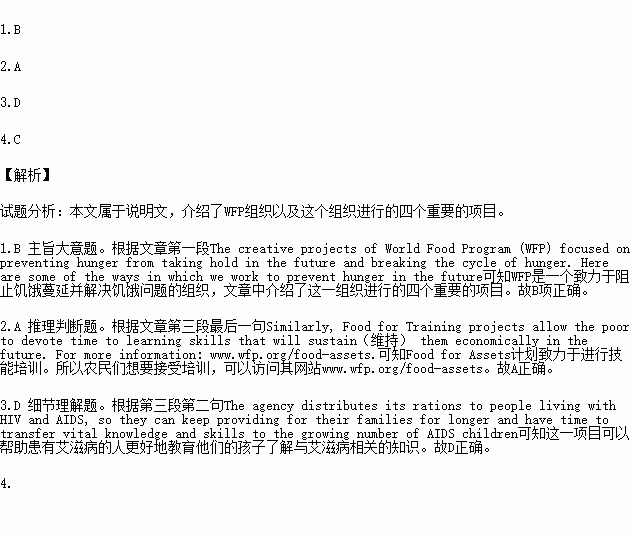题目内容
The creative projects of World Food Program (WFP) focused on preventing hunger from taking hold in the future and breaking the cycle of hunger. Here are some of the ways in which we work to prevent hunger in the future:
School Meals
As well as directly addressing hunger, School Meals projects encourage families to keep their children in school and help them build better futures. If children aren’t hungry they will concentrate on their lessons. With a solid education growing children have a better chance of finding their own way out of hunger. These projects benefit girls especially. For more information: www.wfp.org/schools meals.
Food for Assets(有用的人)
WFP’s Food for Assets projects provide the hungry with food to lay the foundation for a better tomorrow. When poor farmers no longer have to worry about the next meal, they have the time and energy to build irrigation(灌溉) systems that can increase production. Similarly, Food for Training projects allow the poor to devote time to learning skills that will sustain(维持) them economically in the future. For more information: www.wfp.org/food-assets.
HIV/AIDS
WFP uses its food rations(配给) to reduce the blow of HIV and AIDS. The agency distributes its rations to people living with HIV and AIDS, so they can keep providing for their families for longer and have time to transfer vital knowledge and skills to the growing number of AIDS children--the next generation of food providers in developing countries. For more information: www.wfp.org/hiv-aids.
Purchase for Progress
WFP buys large amounts of food in developing countries. It has this purchasing power and uses it to help poor farmers contact reliable markets where they can get competitive prices for their produce. With secure markets, farmers will be encouraged to produce more and innovate(创新).The knock-on effect (连锁效应) is producing more food for everyone. For more information: www.wfp.org/purchase-progress.
1.The text is written with the purpose of ____.
A. seeking solutions to some hot issues
B. introducing some of WFP’s projects
C. raising money for the people in need
D. calling readers’ attention to the poor
2.The farmers who want to receive some training should visit_____.
A. www.wfp.org/food-assets
B. www.wfp.org/hiv-aids
C.www.wfp.org/purchase-progress
D.www.wfp.org/school-meals
3.AIDS children can benefit from food rations in that(在于,因为)_____.
A. they no longer go hungry
B. they can take care of their parents
C. they don’t have to worry about food
D. they can learn more skills from their parents
4.By buying large amounts of food in developing countries, WFP aims to ____.
A. help farmers to increase their income
B. introduce new ways of farming to farmers
C. encourage farmers to produce more food
D. motive farmers to plant different kinds of crops.

